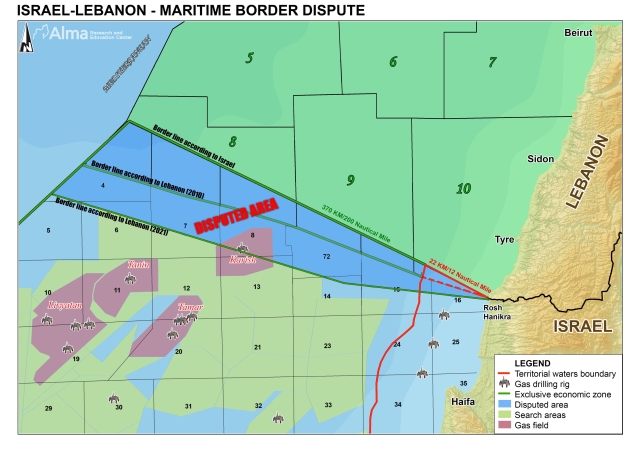The United States is expected to present the outline of the maritime border line agreement between Lebanon and Israel. The agreement is viewed as an American proposal, which the Israeli and Lebanese governments will have to approve or reject.
Following the upcoming agreement that is expected to be signed between the countries, Israel is preparing for Hezbollah’s response, which will likely include some sort of act of aggression or possibly a large-scale attack.
Just before Rosh Hashanah, the Jewish new year that began Sunday evening, Prime Minister Yair Lapid held a meeting with the entire security cabinet in which all the possible scenarios for escalation were presented, as well as all the operational plans that Israel is planning for the possible events.
Last week, the Prime Minister's Office sent a message to Lebanon stating that "Israel believes that it is possible and necessary to reach an agreement on the maritime line between Lebanon and Israel in a way that will serve the interests of the citizens of both countries." It is also written that "the agreement will contribute a lot and be beneficial to regional stability." In addition to this, the Prime Minister's Office clarified that "the production of gas from the Karish rig is not related to the negotiations, the rig will start producing gas without delays as soon as it is possible."
It is estimated that the chances of signing an agreement to determine the maritime-economic border with Lebanon have increased Either way, Israel has already made it clear that it intends to act according to the plan & start pumping in the Karish reservoir. @TimesofIsrael https://t.co/wgBth6syWu
— Shmuel Shalom שמואל سمؤال عبد السلام (@ShmuelShalom) September 29, 2022
Lebanese President Michel Aoun claimed that the negotiations for drawing the maritime border with Israel are in the final stages, and that "Israel plans to connect the gas pipeline from the Karish rig to the coast, and will also conduct a series of tests to make sure that the system is working properly. This is a step that will increase the tensions that already exist between Israel and the organization Hezbollah".
Israel does not clearly know how Nasrallah will react to this move, however, it is highly unlikely that full-scale war will break out in the aftermath of the agreement’s signing. In a very harsh message to Lebanon and Hezbollah through the American mediator, Israel noted that: "Any provocation will be met with a very harsh response."
Hezbollah, the Lebanese terror group, is threatening to attack Israel's offshore Karish Gas Field knowing that this would be a declaration of war. A tactic to pressure Israel in ongoing negotiations between #Israel and #Lebanon or #Hezbollah is deliberately playing with fire. pic.twitter.com/rkbMK65OXK
— Common Sense (@barry100CA) September 28, 2022
In a speech delivered by Hezbollah Secretary General Hassan Nasrallah, called on Israel not to produce the gas until the negotiations between the countries are finished. "We are following the negotiations conducted by Lebanon. Our eyes and ears are directed towards Karish," Nasrallah said.
The maritime borders had been established long ago, as recently as 2018, Lebanon accepted the lines however once gas was found in the Karish field, an economically strapped Lebanon claimed the lines needed to be changed. Hezbollah, a proxy army of the Iranina Revolutionalry Guards, threatened Israel over the border dispute, claiming Israel was pilfering Lebanese assets. While most countries recognize Karish as being in Israeli territory, the U.S. President, Joe Biden who has tried placating the Iranian leaders in exchange for their cooperation in forging a new nuclear deal, asked Israel to negotiate with Lebanon.
Hezbollah, the Lebanese terror group, is threatening to attack Israel's offshore Karish Gas Field knowing that this would be a declaration of war. A tactic to pressure Israel in ongoing negotiations between #Israel and #Lebanon or #Hezbollah is deliberately playing with fire. pic.twitter.com/rkbMK65OXK
— Common Sense (@barry100CA) September 28, 2022
The negotiations are controversial in Israel as some see the country as nodding to a weak U.S. president in order to help him strike a deal with Iran, a country that has vowed to wipe Israel off the map. Nationalists take it a step further, saying to cede any part of the territorial waters now would be to set a precedent that any land in Israel can be realigned to another country, something that is a sensitive issue given the nature of the Israeli-Palestinian conflict.


